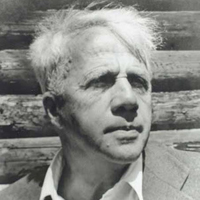Reluctance by Robert Frost: Summary and Analysis
One of the early lyrics of Frost, Reluctance is quite representative of the poets wistful melancholy and a sense of isolation. It was written in 1912 and was published in A Boy's Will in England. It is a characteristic poem by Frost.

Robert Frost (1874-1963)
Describing the end of a journey in the Fall, the poet tells us that he completed his journey through the fields and forests, and over the walls. 'Over the walls' and a few other phrases that follow clearly indicate that the poet's mind was occupied with thoughts when he was travelling. He tells us that he has climbed the visible hills and looked at the world with his eyes, and then has come down. He has taken the road leading homeward, and is happy that the journey is now over. Since it is the autumnal season, the dead and dried leaves are lying scattered over the ground. But the oak is holding back some of its leaves to drop them, later on, one by one and to allow them to be carried away by the force of the wind along the earth with a rubbing and disturbing sound. These leaves will be blown over the crust of snow only to disturb the sound sleepers. Continuing the description of the dead leaves, the poet says that they are lying heaped up in a disorderly fashion and are peaceful. They are no more driven from one place to another. The Michaelmas daisy, that was lonely and last in its bloom, is gone. The yellow flowers of the shrub, known as the ‘witch hazel’ are now dried up. The poet's heart is still anxious to seek after the truth, but the feet stop with a big and baffling question `Whither'. The overwhelming question with the poet is whether he should change his heart inclined to search because the feet are tired or because of the physical hindrance. Would, it not be an act or disloyalty for him to kill the conscience? Should he change his heart with the change of material things? Should he surrender it to the control of reason? Should he reconcile himself with the fallen fate of lost love and past summer season? These are some of the fundamental issues the answer of which the poet is seeking after.
The poem is an expression of the poet’s mood of melancholy and isolation. In the words of Lawrence Thompson, "On the first plane of denotation, the stanzas employ visual images which describe the end of a journey, late in the fall. Although the mood of the title is conveyed between the lines, there is no indication of the cause for such a mood." The suspense is kept unto the last line of pointed analogy between the outer sadness over the end of the summer and the inner sadness over the end of a love.
The development of the poem is through melancholy to self-satisfaction. What though the material possessions are over, the charms of Nature are gone, and love can't last long, man is to live through the light, aspiration, and hope. It is the light by which man must live. Of course, the last stanza sums up the "spiritual drift" of Frost.
Towards the close of the poem, a moral is imperative. Frost's emphasis had ever been on impulse rather than on reason. And in this poem the same poetic conception finds an outlet in the last stanza. Reluctance is a six-line stanza, rhyming a-b-c d-b-d, with three-stress lines throughout except for the last-lines in each stanza. The poem presents a fine example to illustrate Frost's gift for running thought easily along a melodic line.
Related Topics
The Silken Tent: Summary and Analysis
The Death of the Hired Man: Summary and Analysis
Neither Out Far nor In Deep: Summary and Analysis
West Running Brook: Summary and Analysis
Stopping by Woods on a Snowy Evening: Analysis
A Considerable Speck: Literary Analysis
A Considerable Speck: Critical Analysis
Mending Wall: Summary and Analysis
Home Burial: Summary and Analysis
After Apple Picking: Summary and Analysis
The Road Not Taken: Summary and Analysis
Fire and Ice: Summary and Analysis
Nothing Gold Can Stay: Summary and Analysis
Acquainted with the Night: Summary and Analysis
The Gift Outright: Summary and Analysis
 |
bachelorandmaster.com |